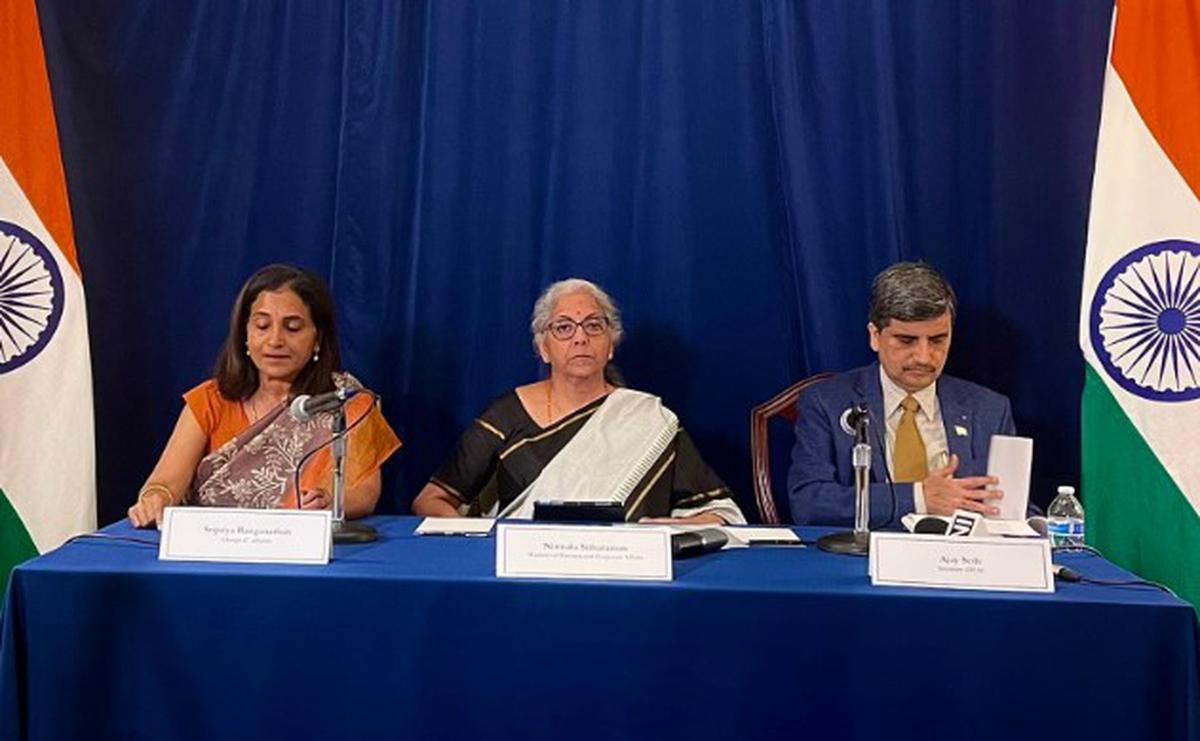Finance
‘G20 finance track’s issues welcomed and reiterated,’ says FM Sitharaman

Taking forward the deliverables from the finance track in the Delhi Declaration in September, G20 member countries have been working on five key themes including reforms of multilateral development banks, digital public infrastructure, issues related to cryptocurrency, climate finance and financing cities of the future.
“Today, on the G20 finance track-related issues, every one of the five main agenda points, which had been discussed over the year, had been reiterated. They were welcomed,” said Finance Minister Nirmala Sitharaman on Wednesday after the virtual summit of G20 Leaders.
Also Read: BT Exclusive: India mulls lowering import duty to drive in Tesla cars, say govt sources
Briefing reporters after the virtual summit hosted by Prime Minister Narendra Modi, the FM said that there have been several discussions on building bigger and more effective multilateral development banks. Many MDBs are also looking at collaborations in areas such as innovative finance, she said, adding that several recommendations of the two reports by the Independent Expert Group are already being implemented.
Sitharaman further said that India has signed MoUs with seven countries for digital public infrastructure to “to share our own experience and technologies”. India is also in the advanced stages with a few more countries for cross-border UPI payments, after signing such agreements with Singapore and the United Arab Emirates. This will enable the acceptance of UPI and QR at merchant outlets in these countries.
Sitharaman indicated that further progress has been made on the G20 agenda on a common regulatory framework for cryptocurrencies and said India would work with the Brazilian presidency to take it forward. The International Monetary Fund and the Financial Stability Board will also will provide regular updates on the implementation of the G20 regulatory roadmap on crypto assets. While there are no timelines at present for how it would be implemented, she said that this may be taken up in the early days of the Brazilian presidency.
This was India’s last G20 meeting during its presidency, before it is taken over by Brazil from December 1. Amitabh Kant, India’s Sherpa to the G20, said Wednesday’s virtual summit was “well attended” and there was participation by 22 heads of govt and all heads of international organisations. The focus was on implementation since the G20 Leaders’ Summit in New Delhi on September 9 and 10.
WATCH: Finance Minister Explains the Upcoming India-Middle East-Europe Corridor

Finance
Personal finance guru Dave Ramsey warns over 'mind-blowing' Christmas debt

Personal finance expert Dave Ramsey joined ‘Fox & Friends’ to discuss the Federal Reserve possibly cutting interest rates and how Americans can avoid overspending during the holidays.
Holiday spending is putting a big strain on American wallets and leaving some in debt well past the holiday season; however, personal finance expert Dave Ramsey said ‘mind-blowing’ debt can be avoided.
“The average over the last several years has been that people pay their credit card debt from Christmas into May,” The Ramsey Solutions personality shared during an appearance on “Fox & Friends” on Wednesday. “So it takes them about half the year to come back, and because they don’t plan for Christmas… it sneaks up on them like they move it or something.”
According to a study conducted by Achieve, the average American will spend more than $2,000 for the 2024 holiday season, breaking down the outflow of cash into travel and holiday spending on hosting parties, food, clothing, and other gifts.
STOP OVERSPENDING OVER THE HOLIDAYS AND START THE NEW YEAR OFF FINANCIALLY STRONG
Another recent survey by CouponBirds indicated that parents will spend an average of $461 per child and that 49% of parents will go into debt to pay for this Christmas.
Ramsey Solutions’ Dave Ramsey says “you won’t overspend” if you stick to a Christmas budget. (Getty Images)
The Ramsey Solutions personality balked at the amount of money shelled out for the season while explaining that the holiday should not come as a shock, and that spending for it should be planned out.
“Those numbers are mind-blowing when you look at the averages there. That’s a lot of money going out,” Ramsey added, “all in the name of happiness comes from stuff, and it doesn’t.”
He also weighed in and agreed on advice from fellow expert, Ramsey Solutions personality and daughter Rachel Cruze, who suggested making a list of people to shop for and noting how much to spend on each.
FOX Business’ Lauren Simonetti details the holiday shopping season on ‘Cavuto: Coast to Coast.’
“You know, I’m old, and I met a guy from the North Pole,” the expert joked. “He said ‘make a list and check it twice,’ so Rachel’s right.”
Ramsey followed up by expanding on his daughter’s suggestion: “If you do that, and you put a name beside it, and then you total up those dollar amounts, you have what’s called a Christmas budget.”
“If you stick to that, you won’t overspend,” “The Ramsey Show” host remarked.
National Retail Federation CEO Matt Shay reacts to the latest report that holiday spending is expected to reach $989B this year.
The money guru pointed out what he sees as problematic with the holiday season – not taking a shot at Christmas itself – but referring back to the spending issues.
“The problem with Christmas is not that we enjoy buying gifts for someone else. That’s a wonderful thing,” he reassured. “The problem is we impulse our butts off, and we double up what we spend because the retailers make all their money during this season.”
GET FOX BUSINESS ON THE GO BY CLICKING HERE
Ramsey concluded by advising shoppers to be wary of retailers and to not be ensnared by their marketing strategies.
“They’re great merchandisers,” he warned. “They’re great at putting stuff in front of us that we hadn’t planned to buy.”
READ MORE FROM FOX BUSINESS
Ramsey Solutions personality Jade Warshaw breaks down the latest economic data that shows consumer credit card debt is piling up amid a jump in spending.
Finance
Can AI Solve Your Personal Finance Problems? Well …

Switch the Market flag
for targeted data from your country of choice.
Open the menu and switch the
Market flag for targeted data from your country of choice.
Need More Chart Options?
Right-click on the chart to open the Interactive Chart menu.
Use your up/down arrows to move through the symbols.
Finance
5 smart ways to use a year-end bonus
Are you expecting a year-end bonus? If so, you’re probably dreaming up all the ways you could spend that windfall.
The average bonus was $2,447 in December 2023, according to payroll company Gusto. That’s a sizeable chunk of change — one that could put you in a better place financially in 2025 with proper planning.
This embedded content is not available in your region.
If you expect a bonus to land in your account soon, it may be tempting to splurge. And that’s perfectly fine. After all, you deserve a reward after working hard all year.
However, before you make an impulsive purchase, consider a few ways you could use those funds to improve your financial situation.
In today’s high interest rate environment, it’s expensive to carry debt. And the higher the interest rates you’re paying, the faster that debt balance can grow.
So, consider using your end-of-year bonus to pay off some of your debts. Not only does this clear your balance faster, but it also saves you money in interest over time.
For example, say you have $3,000 in credit card debt at 21% APR. If you took 12 months to pay off that debt, you’d pay $279 per month and spend about $352 in interest (assuming you don’t make any new purchases on the card).
Now let’s say you receive a $2,000 bonus and use it to pay down your credit card balance to $1,000. In this case, you’d only need to pay $93 per month to eliminate your balance in one year. And you’d pay just $117 in interest — a savings of $235.
Read more: What’s more important: Saving money or paying off debt?
If you’re not sure what to do with your bonus money, you shouldn’t feel pressured to use it right away. You can set it aside in a bank account while you decide. However, if your money is going to sit in the bank, you should at least earn interest and help it grow without any work on your part.
Following the Federal Reserve’s recent rate cuts, deposit account rates are on the decline. Still, there are plenty of high-yield savings accounts, money market accounts, and certificates of deposit (CDs) that pay upwards of 4% APY (or even more). Take some time to compare today’s rates and account options and put your bonus in an account that will help it grow.
See our picks for the best account options today:
It’s important to have a financial safety net in the event of a financial emergency, such as a car repair or job loss. An emergency fund can help you keep your budget intact and avoid taking on new debt to cover a surprise expense.
It’s typically recommended that you keep enough money in your emergency fund to cover three to six months’ worth of living expenses, though you might need more in certain situations. If you don’t already have an adequate emergency fund in place, a year-end bonus could help you get started.
Read more: How much money should I have in an emergency savings account?
One of the best things you can do for Future You is invest for your golden years. In particular, retirement accounts such as 401(k)s and IRAs are a good option because you can contribute pre-tax dollars, which allows you to lower your tax bill in April (or get a bigger refund), as well as defer taxes until you make withdrawals.
For the 2024 tax year, you can contribute up to $23,000 in a 401(k), and an extra $7,000 if you’re age 50 or older. If you haven’t prioritized saving for retirement in the past, or you want to take full advantage of an employer match, you can ask your payroll department to direct some or all of your bonus to your account.
Read more: 401(k) vs. IRA: The differences and how to choose which is right for you
As we mentioned, there’s no harm in splurging once in a while, as long as your financial obligations are squared away.
If you don’t want to feel like you’re depriving yourself, set aside half of your bonus for a “responsible” purpose and use the other half however you’d like. This can give you the momentum you need to stay the course when it comes to your financial goals, while still enjoying the fruits of your labor.
Read more: How much of your paycheck should you save?
-

 Politics1 week ago
Politics1 week agoCanadian premier threatens to cut off energy imports to US if Trump imposes tariff on country
-
/cdn.vox-cdn.com/uploads/chorus_asset/file/25789444/1258459915.jpg)
/cdn.vox-cdn.com/uploads/chorus_asset/file/25789444/1258459915.jpg) Technology1 week ago
Technology1 week agoOpenAI cofounder Ilya Sutskever says the way AI is built is about to change
-

 Politics1 week ago
Politics1 week agoU.S. Supreme Court will decide if oil industry may sue to block California's zero-emissions goal
-
/cdn.vox-cdn.com/uploads/chorus_asset/file/25546252/STK169_Mark_Zuckerburg_CVIRGINIA_D.jpg)
/cdn.vox-cdn.com/uploads/chorus_asset/file/25546252/STK169_Mark_Zuckerburg_CVIRGINIA_D.jpg) Technology1 week ago
Technology1 week agoMeta asks the US government to block OpenAI’s switch to a for-profit
-

 Politics1 week ago
Politics1 week agoConservative group debuts major ad buy in key senators' states as 'soft appeal' for Hegseth, Gabbard, Patel
-

 Business7 days ago
Business7 days agoFreddie Freeman's World Series walk-off grand slam baseball sells at auction for $1.56 million
-
/cdn.vox-cdn.com/uploads/chorus_asset/file/23951353/STK043_VRG_Illo_N_Barclay_3_Meta.jpg)
/cdn.vox-cdn.com/uploads/chorus_asset/file/23951353/STK043_VRG_Illo_N_Barclay_3_Meta.jpg) Technology7 days ago
Technology7 days agoMeta’s Instagram boss: who posted something matters more in the AI age
-
News7 days ago
East’s wintry mix could make travel dicey. And yes, that was a tornado in Calif.




















